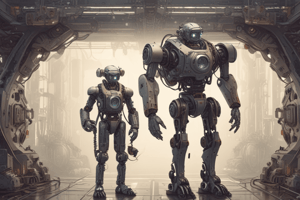Podcast
Questions and Answers
Which type of robot is primarily designed for manufacturing and production tasks?
Which type of robot is primarily designed for manufacturing and production tasks?
- Industrial robots (correct)
- Exploration robots
- Service robots
- Educational robots
What is the primary purpose of service robots?
What is the primary purpose of service robots?
- To teach coding and robotics
- To perform high-precision manufacturing tasks
- To assist humans in daily tasks (correct)
- To explore inhospitable environments
Which type of robot is used to explore environments that are dangerous or inhospitable for humans?
Which type of robot is used to explore environments that are dangerous or inhospitable for humans?
- Service robots
- Exploration robots (correct)
- Industrial robots
- Educational robots
What is the primary purpose of educational robots?
What is the primary purpose of educational robots?
Which type of robot is often used in the automotive manufacturing industry?
Which type of robot is often used in the automotive manufacturing industry?
Which type of robot is designed to interact with humans and assist them in their daily lives?
Which type of robot is designed to interact with humans and assist them in their daily lives?
Which of the following is NOT mentioned as a common application of robotics in the text?
Which of the following is NOT mentioned as a common application of robotics in the text?
What is one benefit of using robots in manufacturing?
What is one benefit of using robots in manufacturing?
Which of the following tasks is NOT mentioned as an application of robotics in agriculture?
Which of the following tasks is NOT mentioned as an application of robotics in agriculture?
What is the primary purpose of using robots in space exploration, according to the text?
What is the primary purpose of using robots in space exploration, according to the text?
Which type of robot is mentioned as an example of how robotics is transforming the transportation sector?
Which type of robot is mentioned as an example of how robotics is transforming the transportation sector?
Which of the following statements about the future of robotics is true?
Which of the following statements about the future of robotics is true?
Flashcards are hidden until you start studying
Study Notes
Robotics
Robotics is the branch of technology that deals with designing, building, operating, and using machines called robots. These machines can take many forms and serve various purposes, from industrial automation to space exploration. Understanding the different types of robots and their applications is crucial to appreciating the versatility and importance of robotics in our daily lives.
Types of Robots
There are several types of robots, each with its unique features and functions. Some of the most common include:
-
Industrial robots: These are large, powerful machines designed for manufacturing and production tasks. They are often used in automotive manufacturing, electronics assembly, and other industries where high precision and consistency are required.
-
Service robots: These robots are designed to interact with humans and assist them in their daily lives. Examples include robotic vacuums, lawn mowers, and delivery drones.
-
Exploration robots: These robots are used to explore environments that are inhospitable or dangerous for humans. Examples include underwater robots, which can explore the ocean floor, and Mars rovers, which help us understand the surface of the red planet.
-
Educational robots: These robots are designed to teach children about coding and robotics. They are often smaller, less powerful, and more accessible than industrial or exploration robots, making them ideal for educational purposes.
Robotics Applications
The applications of robotics are vast and varied, with new uses emerging all the time. Some common applications include:
-
Manufacturing: Robots are widely used in factories and production facilities to automate repetitive tasks, improve efficiency, and reduce costs.
-
Healthcare: Robots are increasingly being used in healthcare to assist with surgeries, rehabilitation, and patient care.
-
Transportation: Autonomous vehicles and drones are just two examples of how robotics is transforming the transportation sector.
-
Agriculture: Robots are being used to automate tasks such as crop monitoring, irrigation, and harvesting, improving efficiency and reducing the need for manual labor.
-
Space exploration: Robots are essential for exploring the vastness of space, from Mars rovers to telescopes that capture images of distant galaxies.
In conclusion, robotics is a rapidly evolving field that is transforming many aspects of our lives. From industrial automation to healthcare, transportation, agriculture, and space exploration, the applications of robotics are diverse and ever-expanding. As technology continues to advance, we can expect to see even more innovative uses for these machines in the future.
Studying That Suits You
Use AI to generate personalized quizzes and flashcards to suit your learning preferences.




